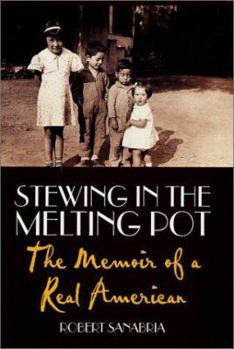Stewing in the Melting Pot: The Memoir of a Real American
Select Format
Select Condition 
Book Overview
Through the eyes of one of its own, Stewing in the Melting Pot will touch the hearts of all who have lived between two cultures and who have never felt completely accepted by the mainstream American culture. This is the story of a Mexican-American family struggling to survive in pre-and post-World War II America. Robert Sanabria was four years old when his mother took her four children and fled from an abusive husband in Texas to Los Angeles. There,...
Format:Hardcover
Language:English
ISBN:1892123460
ISBN13:9781892123466
Release Date:July 2001
Publisher:Capital Books (VA)
Length:228 Pages
Weight:0.95 lbs.
Dimensions:0.9" x 6.8" x 9.7"
Related Subjects
Artists, Architects & Photographers Arts & Literature Authors Biographical Biographies Biographies & History Biography & History Ethnic & National History Literature & Fiction Memoirs Minority Studies Politics & Social Sciences Regional U.S. Social Science Social Sciences Specific Demographics State & Local WestCustomer Reviews
3 ratings
El Jarabe Tapatio
Published by Thriftbooks.com User , 19 years ago
Colton, California, settled by the Mormons, has become a magnet for Latinos. The author's mother had parked her children in an orphanage for ten years. She was a woman of secrets. Robert Sanabria's mother had left her husband for reason of abuse. At the time the family had lived in El Paso. Mother and children left El Paso in 1935. The mother had lived through the Mexican Revolution. In later years Robert felt comfortable speaking of Mexican history with his mother to spare both of them a discussion of family history. Why the children had been placed in the orphanage was a painful topic. At the orphanage the author, who began his stay there at age four, developed a distaste for turnips and eggplant. After his mother's death he learned that she had never revealed to him the identity of his father, an Italian. Robert Sanabria had been drawn back to his family upon the failure of his first marriage. By that time his mother was an invalid. For forty years reunions of the orphanage home children had been held. Robert had come to realize that fleeing from his past was misguided. From 1945 to 1994 he had avoided facing his stay at the Home, and, also, had failed to attend any of the reunions. Regina Rivera, Re, had grown up in the home and had stayed as matron until it closed. She organized the reunions. Robert's second wife helped him to see his hometown, Sierra Madre, as charming. He learned the Home had been founded by a highly motivated, (politically correct), Methodist missionary, Katherine Higgins. The impetus was an incident of a seven year old girl being left on the steps of of the philanthropic organization in the 1920's. Mexican peons, victims of the plantation system, began to pour into California after of the Mexican Revolution in 1915. In the 1930's Mexicans were being deported, sometimes unlawfully, and Robert's mother feared that in the family's destitution they would come to the attention of immigration officials. The local Congregational Church took great interest in the Home. The minister was a member of the Home's advisory committee. The Protestant Churches of the time engaged in activities to Americanize the subjects of their charities. Two years after the opening of the Home a very able manager, Miss Gibson, was engaged. During the Depression the Home had problems feeding, clothing, and sheltering the children. Many of the townspeople were concerned. There was a fiesta staged to raise money. In 1937 the matrons got salary increases. Times were improving. In the late 30's a new boys' dorm was built where the boys lived in comparative luxury. A sandbox was installed by the Kiwanis Club. In 1938 the children attended vacation bible school for four weeks, then a new thing. After Pearl Harbor there were air raid alerts. Some former Home boys were in the service. When Robert's sister Henrietta left the Home at age 14, Robert ran away to his mother and stepfather but he was returned to the orphanage
Stewing in the Melting Pot: The Memoir of A Real American
Published by Thriftbooks.com User , 20 years ago
A heartfelt auto-biography about the author's childhood years growing up in an American-cultured orphanage as a Mexican with no chance to explore his Mexican heritage; causing self-loathing and anger to get in the way of finding who he really is as a person. Sharing his experiences with the reader on growing up at the orphanage must have taken enormous courage: tactfully and fairly telling the reader how other people's bias in his life effected him. He invites the reader into his childhood with candor and grace, providing poignant accountings of his years at the orphanage interspersed with moments of humor. I was very impressed with the author's ability to look back at his youth, expressing his feelings so candidly and with such honesty. This is a book that most Depression-era children having little or nothing and with their own personal struggles, can relate to. I found the book to be thouroughly enjoyable and hard to put down at times.
"Stewing" is an important memoir about loss and discovery
Published by Thriftbooks.com User , 23 years ago
"Stewing in the Melting Pot: The Memoir of a Real American" by Robert Sanabria, a sculptor and retired military officer, details the author's experience growing up in a Methodist-run orphanage for Latino children in Southern California during the Depression. It is an absorbing and at times aching account of the process by which the author, his siblings, and other orphans at "The Home" are stripped of their Latino heritage to assimilate into America of the 30s and early 40s. The author deftly intertwines themes of struggle: to uncover truths about his past; and to accept the identity confusion he still bears. His is an experience to which many "Americans" can relate.Jessica Kasten





